Thinking of Our Ancestors
I visited a fair that sent me thinking of my ancestors, the peasants of Romania. The fair is held in the courtyard of the most interesting museum in Bucharest, Romania. The Romanian Peasant Museum.
As the name suggests, the museum presents the life, customs, decorative objects and tools, clothing, and houses of the Romanian peasants of the past. In 1996, the museum was awarded the European Museum of the Year Prize by the European Museum Forum.
Unfortunately, due to the pandemic the museum is closed and only the exhibitions and fairs in its courtyard can still be visited.
Like any fair, this one has it all. From ornaments to clothes, from flowers to food, but it also had something special that fits with the museum's object of activity, namely, old objects from peasants' houses from hundreds of years ago.
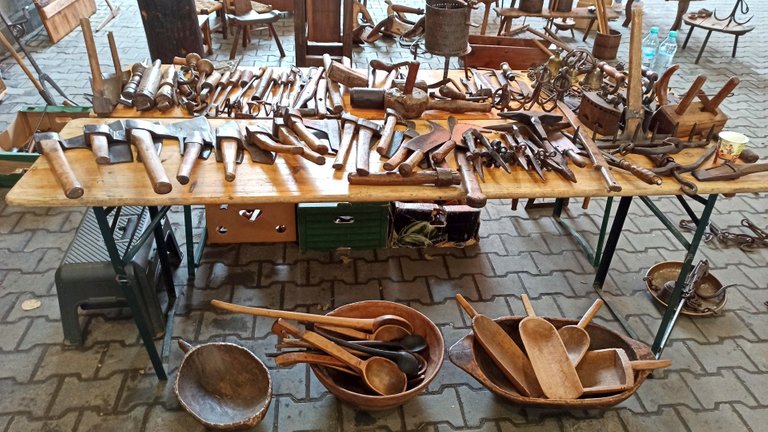
The way these objects were presented was somewhat confusing and I didn't understand if this way was intentionally chosen to boost the imagination and knowledge of the visitors, or it was simply a non-determined presentation and a certain disinterest.
Why do I say this?
Because these old and valuable objects were scattered in a corner of the fair, without labeling and without anyone to explain the exhibits. I liked this kind of exhibition because no one bothered me and I could admire the place at my leisure. Even more, it gave me the opportunity to check if I knew the usefulness of the exhibits.
I am going to present some exhibits below. Before I do that I want to say that I chose to post in the Architecture+Design Community without knowing if the things to be presented can be framed here. I'm inclined to think they fit because they can be framed under design, if not interior design then product design. Is this right? If it's not right, then ignore it and forgive my mistake.
With these clarifications made, I will start the presentation of the objects. As I said, the objects seem more stored than presented. There is no description of them, there is no guide and this makes me appeal to my limited knowledge to tell you their usefulness. Some items I have seen and some I have used but there are a few where I will only express an uninformed opinion.

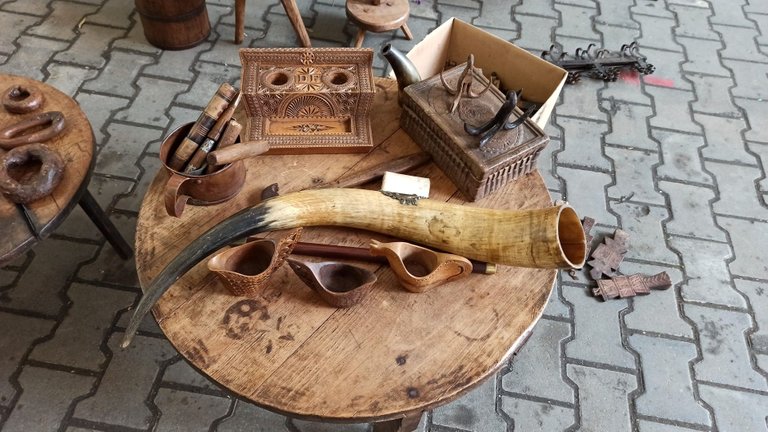
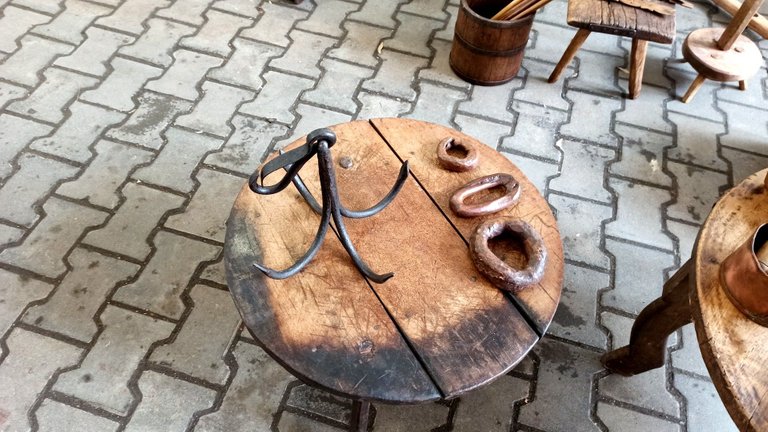
I believe these are items used for hunting and fishing. Anchor-shaped hooks suggest the size of the fish that populated rivers and lakes in past centuries. Small, beautifully ornamented wooden boxes, probably used to hold these hooks. There is a goat horn on the table, and if the small wooden pots are anything to go by, I think it was used in hunting to store gunpowder.

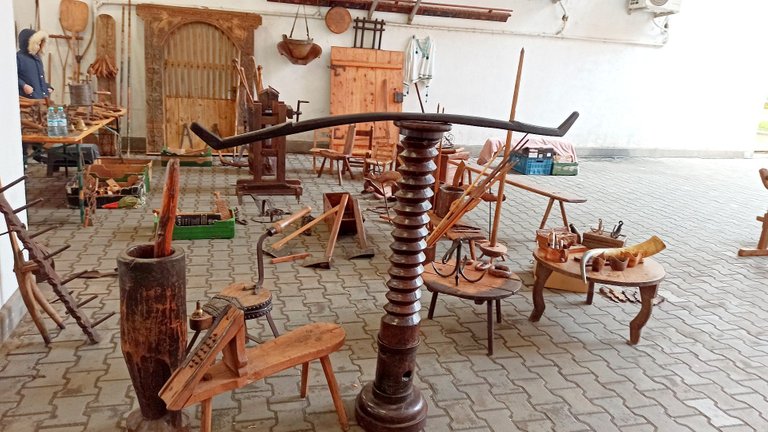
In the foreground is a press. I don't know what it was used for, maybe fixing something. Next to it, the wooden object that looks like a bench, I think it was used for the sheep's wool, to stretch the wool threads. The tall wooden pot probably a crusher, all sorts of seeds were broken up, and next to it are some bellows (for maintaining the fire in the oven). Leaning against the wall on the left is a rake.

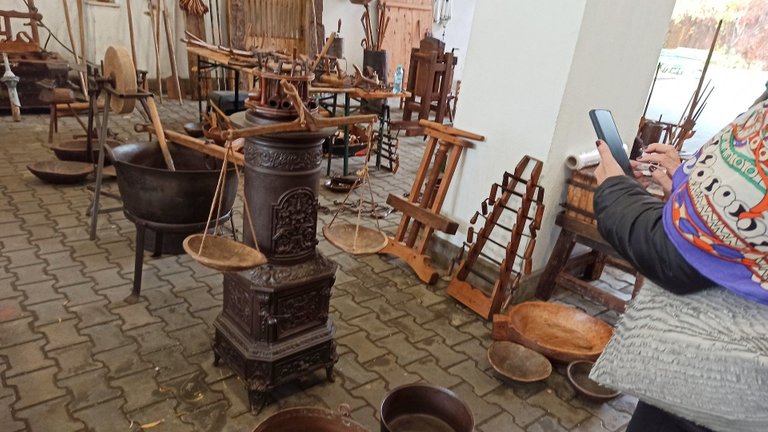
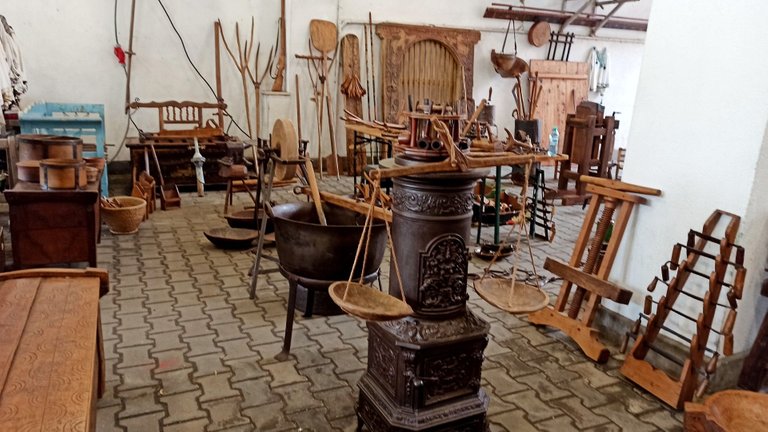
Well, we've moved on to iron, metal objects. In the foreground is a small stove called Godin, much used in the last century. I remember my grandmother had one just like it. I remember well because I burned my leg very badly and had a mark on my leg for many years. The other metal object is a large pot used to boil fruit to make jam. Especially from plums, a kind of marmalade. And that's what I remember as a child, I also played at making marmalade.
Hanging from the stove is a wooden scale. Probably not extremely accurate but it was useful. Leaning against the wall is a wooden press and the other object I don't know what it is. On the left side is a wooden crate in which clothes were put.

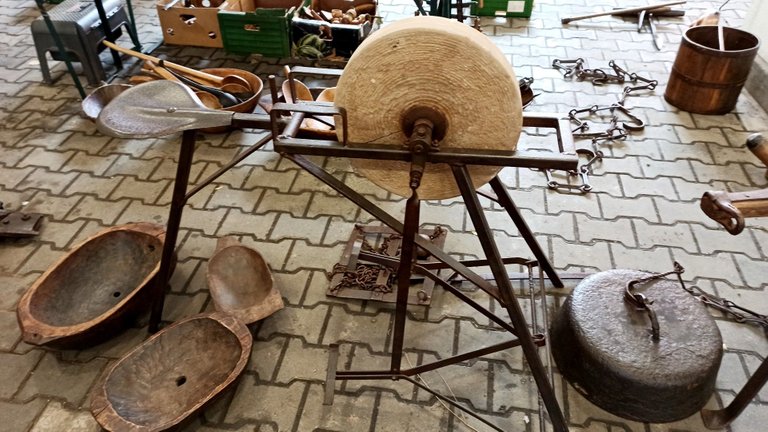
The biggest object is a grinder, not the whole object because there had to be a pedal like on a bicycle and some belts that turned the abrasive stone. The metal object on the right is called a "test" and I don't know if it can be translated into English. That metal bell was heated in a fire and then placed over a pot of meat or bread to bake. The result was very tasty food and this object is still used today in some villages.
On the left are some wooden pots, called "covata". My grandmother used them to make bread, i.e. to mix flour with water and salt. I see they have a hole in the middle, it means they were used to drain liquid from something, maybe cheese?

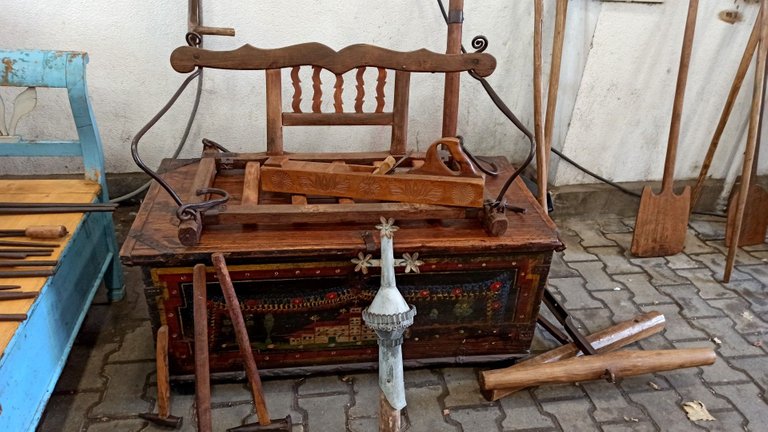
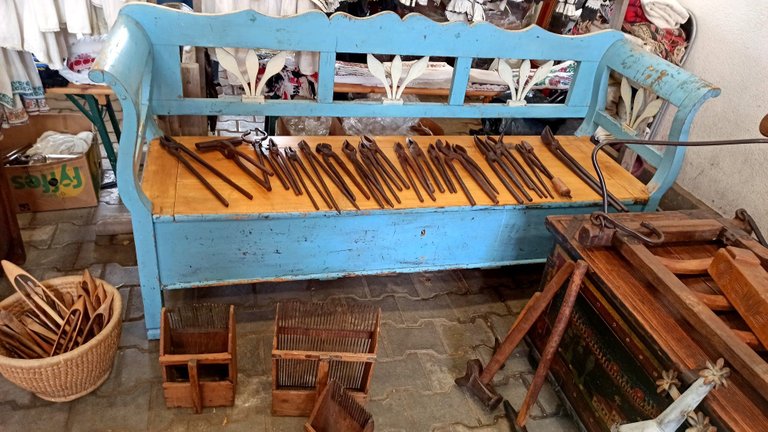
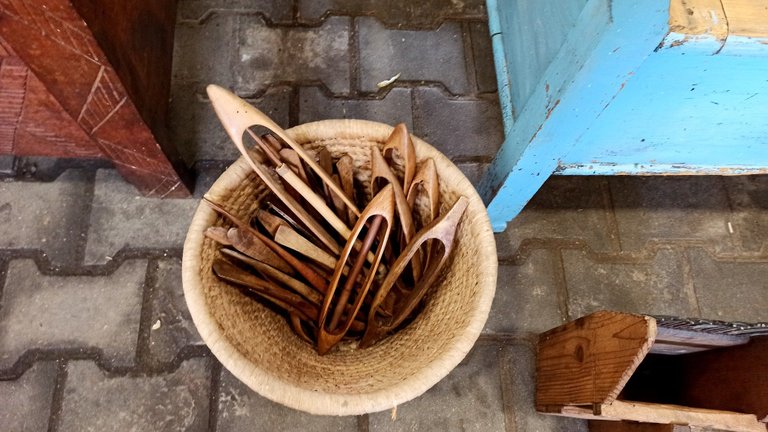
Well, here are more mixed. A painted wooden crate, in which were kept items of clothing, especially of the girls to get married. On the crate, there seems to be a part of a carriage or sled, namely the seat with the backrest. On the right, some very large drills used to work and join the wood.
In the second photo, we have a large bench that also has a chest. This is where the bed linen was kept. On the bench are several kinds of pliers used for working sheet metal and metal.
In the bottom basket are some objects called "suveica", used for weaving canvas and carpets. Wooden boxes with those metal teeth were used to process sheep wool.

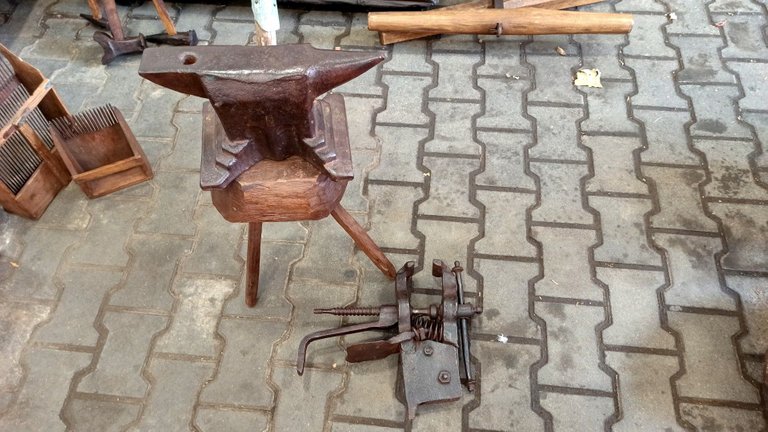
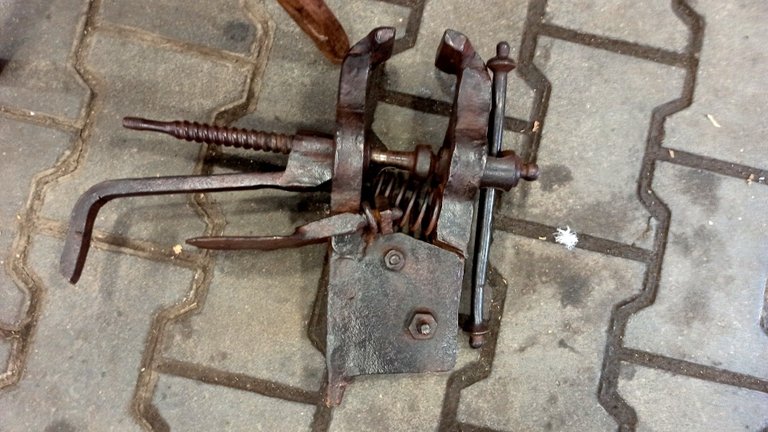
On the chair is a metal object used in metalworking. I forget what it's called, I knew it when I started writing but now I can't remember. On the floor is placed a vise.

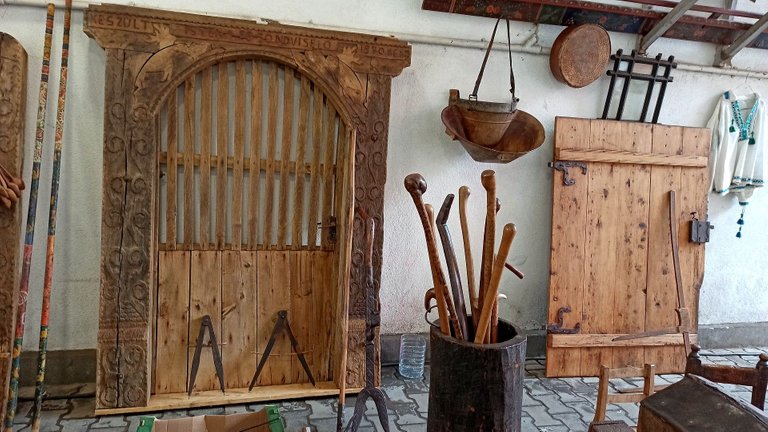
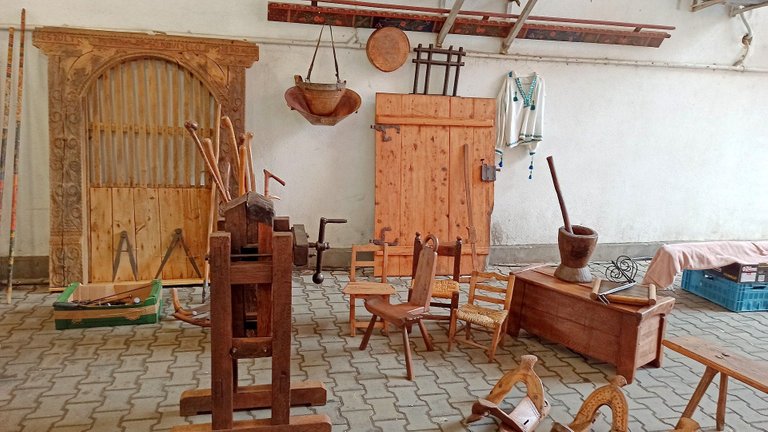
Leaning against the wall is a gate. I really like the carved wooden frame. I wish I could have bought it but it wasn't for sale. I have bought a few old items over the years that I will show at the end of the post.
On the right is a simple door, I remember that my grandmother's house also had such doors. In the wooden support, I see some sticks used by the old people so that they can walk more easily.
In the second picture, you can see more wooden objects, again a crate, some chairs, and a saddle. In the middle I don't know what it is, it looks like a woodworking table.

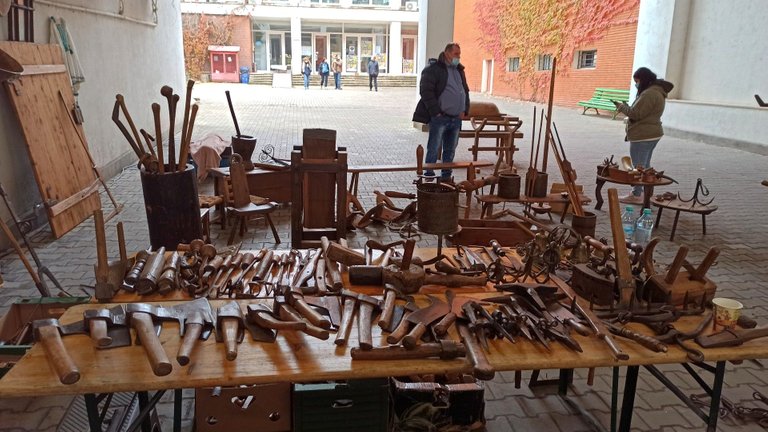

A lot of woodworking tools are placed on the table. In front of the bench are some objects made with these tools. Impressive achievements, aren't they?

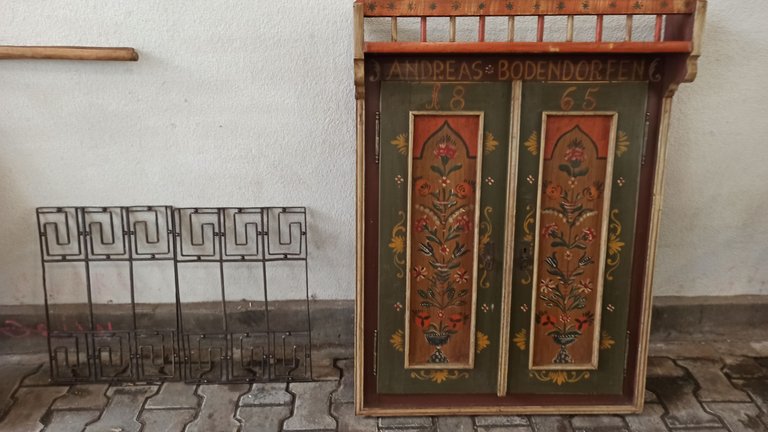
Part of a kitchen cupboard, painted wickerwork specific to the old inhabitants of Romania of German origin. A wrought iron window grille.
I have a friend who has kitchen furniture made from these painted parts.
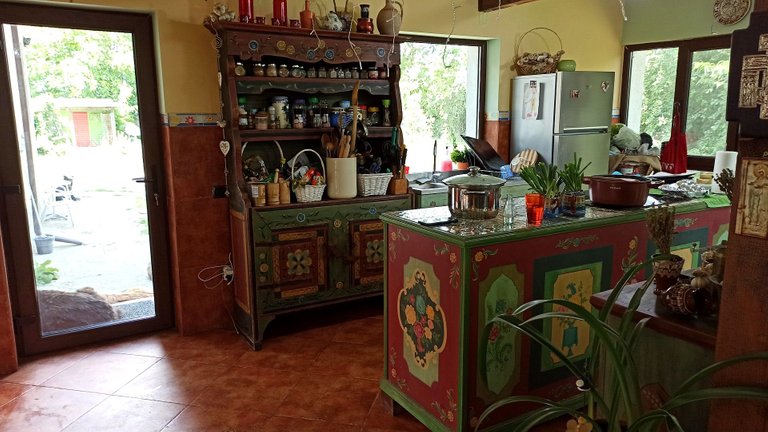
As I said, I bought some old folk art items a few years ago. Also from this place.

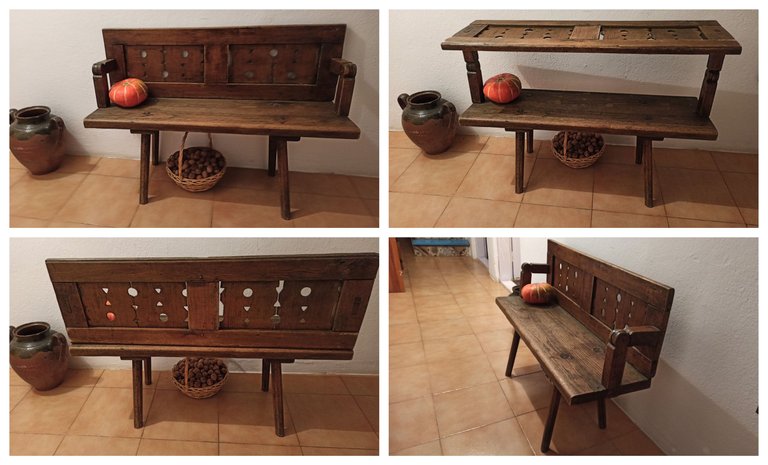
It's a 150-year-old bench. Very cleverly constructed, it has a folding backrest. This bench was placed at the end of the bed and when they lay down, they turned the backrest over and made a longer bed.

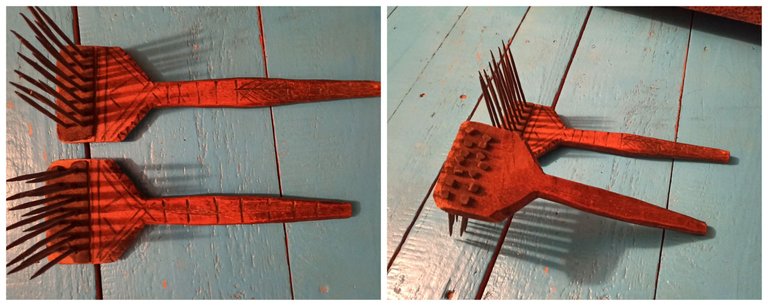
These paddles were used to clean and stretch the sheep's wool threads before they were spun.

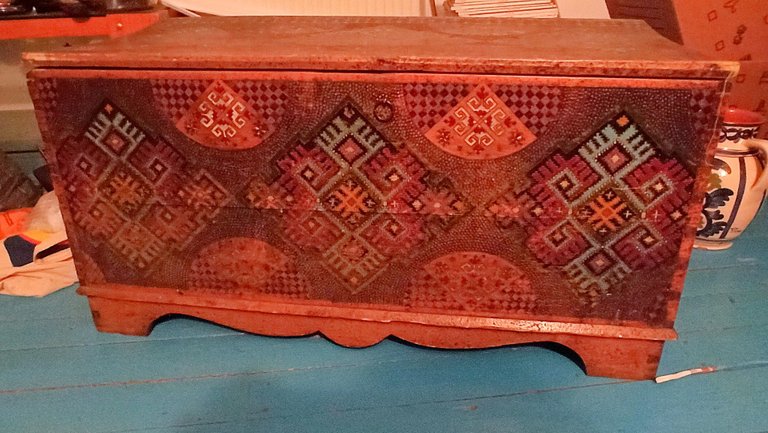
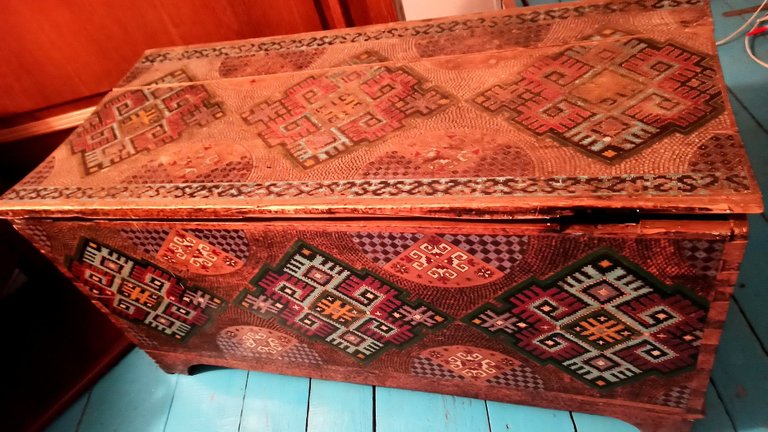
This is a dowry chest, it was put the clothes made by a girl for her groom before the wedding. It's very old and it's a little damaged. I need to repair it.

#sublimesunday, topic proposed by @c0ff33a
#beautifulsunday, topic proposed by @ace108
HiveBloPoMo - Day 7
This is my attempt to post every day in November!

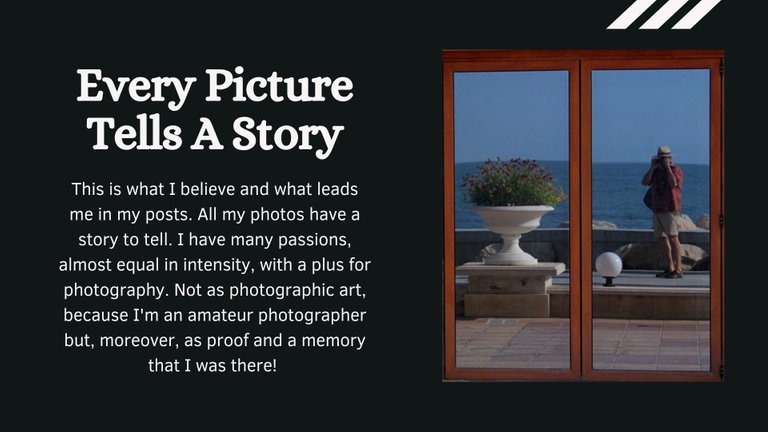

Hello @bluemoon, we're extremely delighted to have you back in the Architecture+Design Community! The Romanian Peasant Museum is simply impressive. This is one of the most remarkable exhibition spaces I've seen due to its detailed portrayal of the livelihood, culture, and habits of the Romanian peasants from history. It's certainly a powerful theme for that location as it gives us a sneak peek into what it was like during that period. That interesting place is undoubtedly a goldmine of knowledge because it teaches us the foundations, though primitive, of the current technologies we enjoy nowadays. Fantastic publication! 😊
The pleasure is mine, of course! I look forward to the reopening of this museum, the inside part, to show it here. I think it is the best-made museum in Romania. I hope it still is because I visited it about ten years ago and maybe it has been modified. Because, unfortunately, in my country, good things don't last long.
Thank you for your comment which is always a pleasure and an encouragement.
Congratulations @bluemoon! You have completed the following achievement on the Hive blockchain and have been rewarded with new badge(s):
You can view your badges on your board and compare yourself to others in the Ranking
If you no longer want to receive notifications, reply to this comment with the word
STOPCheck out the last post from @hivebuzz:
Support the HiveBuzz project. Vote for our proposal!
Amazing post 🤩🤩🤩
Thank you!
Wow! All wooden things! Love the axe!
Glad you like, thanks!
Interesting pieces, I saw several very similar to those I found in my grandparents' house, and in the country houses of my country, they are relics that for me would look very good in a corner of a house.
Good for the museum that preserves all these pieces very well. I hope they continue like this in memory of the past.
These objects are now decorative, have lost their functionality but are good to keep somewhere in the house as a souvenir.
Many old style carpentry tools there. I think some of modern wood workers may not even know how some of these works.
I certainly don't know. It's amazing what they could do with these tools in the past.
Amazing! I love to visit museums as well because they simply give us a glimpse of history and I'd love to have a least one piece of the collection at home. So beautiful!
The museums are wonderful. The exhibits in the museums are not for sale, but similar items can be found at various fairs.
Well done @bluemoon! We're happy to inform you that this publication was specially curated and awarded RUNNER-UP in Architecture Brew #46. Congratulations!
Subscribe to Architecture+Design, an OCD incubated community on the Hive blockchain.
Thank you very much! I'm so glad when I get this news from you.
We're always grateful to you too @bluemoon for publishing epic content in our beloved community. Stay as great as you are! 😊
Thank you very much!
Those tools are so amazing. If I ever get to visit Romania I will include Romanian Peasant Museum in my itinerary. Have a nice day.